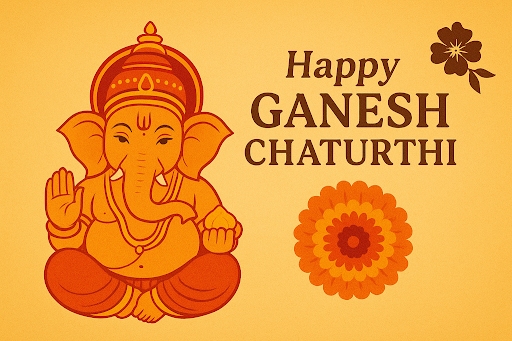What is Ganesh Chaturthi?
Ganesh Chaturthi is a vibrant and joyous festival celebrated in honour of Lord Ganesha, the elephant-headed deity known as the remover of obstacles and the god of beginnings. This festival marks the birth of Ganesha, who is widely revered in Hinduism.
Ganesh Chaturthi is celebrated with great enthusiasm across India and by Hindu communities worldwide, bringing families and friends together in a spirit of unity and devotion.
Importance of Lord Ganesha
Lord Ganesha holds a special place in the hearts of millions. He is considered the harbinger of good fortune and success, making him an essential figure in various rituals and ceremonies.
His image is often invoked before the commencement of any new venture, whether it be a business, a journey, or a significant life event. Ganesha embodies wisdom, intellect, and prudence, and his teachings inspire people to overcome challenges with determination and grace.
Date of Ganesh Chaturthi 2025
When is Ganesh Chaturthi 2025?
In 2025, Ganesh Chaturthi will be celebrated from Tuesday, 26 Aug, 2025, 1:54 pm to Wednesday, 27 Aug, 2025, 3:44 pm.
Devotees will bring home beautifully crafted idols of Lord Ganesha, perform rituals, and offer prayers. The festival is marked by joy, music, and community celebrations across India..
How the Date is Determined
The date of Ganesh Chaturthi is determined based on the Hindu lunar calendar. It falls on the fourth day (Chaturthi) of the waxing moon phase in the month of Bhadrapada, which usually corresponds to August or September in the Gregorian calendar. The exact timing can vary each year, so it is essential to check local calendars for accurate dates and timings for rituals and celebrations.
Historical Background
Origins of Ganesh Chaturthi
The origins of Ganesh Chaturthi can be traced back to ancient times. The festival gained significant prominence in the 19th century, particularly through the efforts of social reformers like Lokmanya Tilak.
He transformed Ganesh Chaturthi from a private celebration into a grand public festival to foster unity and encourage the fight against British colonial rule. This shift helped to cultivate a sense of community and nationalism among the people.
Historical Celebrations in India
Historically, Ganesh Chaturthi was celebrated in homes with simple rituals and family gatherings. Over time, it evolved into a public festival, with elaborate decorations, cultural performances, and community gatherings.
Cities like Mumbai became the epicenter of grand celebrations, where large idols of Ganesha are installed in public spaces, and devotees come together to offer prayers and partake in festivities. Today, millions participate in these celebrations, showcasing the festival’s deep-rooted cultural significance.
Significance of Ganesh Chaturthi
Cultural Importance
Ganesh Chaturthi is not just a religious occasion; it is a cultural phenomenon that reflects the rich traditions and diversity of India. The festival brings people from various backgrounds together, fostering a sense of communal harmony and shared values.
It is a time for cultural expression, with artistic displays, music, dance, and theatre performances that celebrate the spirit of Ganesha. The festival also encourages local artisans and craftspeople, as many create beautiful idols and decorations for the celebrations.
Religious Significance
From a religious perspective, Ganesh Chaturthi is a time for reflection, devotion, and spiritual growth. Devotees engage in prayers and offerings, seeking Ganesha’s blessings for prosperity, wisdom, and the removal of obstacles in their lives.
The rituals performed during this time, including the chanting of mantras and performing aarti, are intended to deepen one’s connection to the divine. The festival also serves as a reminder of the importance of humility and the need to overcome personal challenges with faith and perseverance.
Celebrations of Ganesh Chaturthi
Preparations for the Festival
As the festival approaches, preparations begin well in advance. Families clean and decorate their homes to welcome Ganesha. Many choose to bring home a clay idol of Ganesha, which is often adorned with vibrant colours and intricate designs.
In public spaces, local communities collaborate to set up elaborate pandals (temporary structures) that house larger idols of Ganesha. These pandals are decorated with lights, flowers, and thematic displays that attract visitors.
Rituals and Traditions
The rituals associated with Ganesh Chaturthi are both rich and varied. Common practices include:
- Pranapratishtha: The ritual of invoking life into the idol, allowing Ganesha to be worshipped.
- Daily Pujas: Offering prayers, flowers, sweets (especially modaks, which are Ganesha’s favourite), and fruits to the idol each day.
- Aarti: Singing hymns and performing aarti, a ritual of light, to honour Ganesha.
- Visarjan: The immersion of the idol in water at the end of the festival, symbolising the cycle of creation and dissolution.
Each of these rituals holds deep meaning, reinforcing the bond between devotees and the divine.
Community Celebrations
Community celebrations play a vital role in Ganesh Chaturthi. Neighbours and friends come together to participate in events, such as cultural performances, dance, and music. Many communities organise competitions, including singing and dance contests, to engage people of all ages.
These gatherings foster a sense of belonging and create lasting memories. The festival also serves as a platform for social messages, with many pandals promoting themes like environmental awareness and communal harmony.
Conclusion: Ganesh Chaturthi is a festival that transcends mere celebration; it embodies the spirit of community, devotion, and cultural richness. As you partake in the festivities, whether at home or in public spaces, you contribute to a long-standing tradition that honours Lord Ganesha and brings people together.
The teachings of Ganesha encourage you to embrace challenges, seek wisdom, and foster unity, making Ganesh Chaturthi not just a time of joy, but also a period of reflection and growth.
Check out our detailed guides on Holidays in August 2025 and Holidays in September 2025 to make the most of the festive season with family, travel, and traditions.



